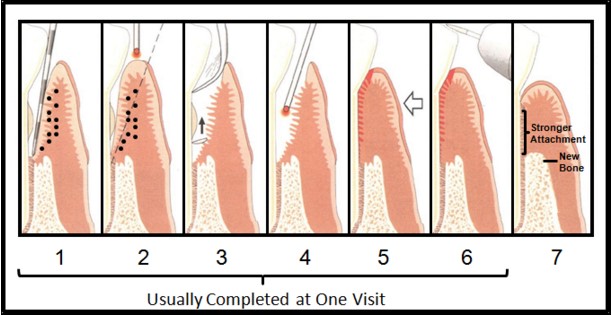Gum disease is one of the leading dental problems in the US today. Other than keeping your smile bright, looking out for your gums is also essential. Even a person that has healthy, radiant teeth can have gum disease. That’s what makes it so insidious. Even though you’re suffering from it, you may not even experience any pain.
Even though it is less common than it once was, gum disease still affects 10 percent of all American adults. That is 25 million people at any one time. Flossing every day, brushing regularly, and other simple practices can keep you from joining this number. Here are some tips and tricks for keeping your gums healthy.
Brush Two Times a Day
Brushing your teeth after every meal will help remove the plaque and food trapped in the space between your teeth and gums. Scrubbing the tongue is also important because the surface can harbor bacteria. Choose a brush with soft bristles to avoid hurting your gums.
Floss Daily
Flossing also helps with removing trapped plaque and food that your brush can’t reach. This will keep your gums squeaky clean.
Regular Cleaning
Getting regular periodontal cleaning can help you prevent gum disease. It can also help with early detection if you have already developed a mild case without realizing it. Choose a clinic that offers examinations and deep dental cleaning so that you can get the most out of your visit. In Arizona, one of the best options is the AZ periodontics clinic.
Use Fluoride Toothpaste
There are many kinds of toothpaste out there. But the best choice for healthy gums is those that contain fluoride. Also, try to make sure that the American Dentist Association has accepted the brand you choose. The ADA tests and approves only the best kinds of toothpaste on the market.
What If I Think I Have a Gum Infection?
If you suspect that you have a gum infection, it’s best to schedule an appointment with our Phoenix periodontist so that you can get a diagnosis. If you have developed gum disease, we can help. Whether your case is mild or severe, there are a few procedures to treat it including the following.
Periodontal Cleaning
Cleaning is the first line of defense when it comes to gum infection. Prevention is always the best medicine. Regular cleaning appointments can reverse the effects of plaque buildup and improve your gum health. If you have a mild case, these cleaning sessions can help manage the infection.
LANAP
Laser-Assisted New Attachment Procedure (LANAP) is surgical laser treatment. This surgery is available at our AZ Periodontics Clinic. It forms new connective tissue attachments between the teeth and the gums. Unlike the old method of periodontics treatment, LANAP is faster and less painful for patients. Recovery is shorter because the procedure provides less physical trauma to the gum tissue.
If you have health concerns that prevent you from surgery, LANAP is the best option. The nature of laser treatment is different from traditional surgery, and it can save your gums from deteriorating further. It helps the gums to reattach to the teeth and protects the tooth root.
Pocket Reduction Surgery
Every tooth is supposed to have gum tissue fitting tightly around it in a healthy mouth. The bone should fit around it as well. However, as periodontal disease progresses, the fit loosens. Eventually, the bones and tissues that provide support to the teeth weaken, creating pockets around them. To avoid loss of teeth, it is vital to keep these pockets from growing.
Pocket reduction surgery aims at eliminating these spaces. When they are allowed to grow, they become a breeding ground for bacteria to take hold. This can only make the spread and severity of the disease faster. With enough bacteria in the gums, not only can you experience tissue loss, but you can also start experiencing bone loss. Although professional cleanings can help reduce the number of bacteria, some pockets are too deep to access externally.
With the pocket reduction surgery, Dr. Trujillo can fold back the affected tissue, clean these pockets, and suture the gum tissue back into place correctly. This not only eliminates bacteria but also returns the tight fit of the gum tissue.
Pocket Irritation Surgery
Pocket irrigation – or oral irrigation – is a treatment that helps with preventative care. However, it can also help with managing a current infection. With the help of a tool, an antimicrobial agent, water, or a mixture of both, is used for flushing out bacterial buildup in periodontal pockets. In some cases, pocket irrigation surgery is a part of your deep cleaning session.
This procedure is the right choice for you if you are at risk for periodontal disease. If your periodontist notes this risk during your consultation, they may recommend it as a preventative measure. If you feel that the spaces between your teeth have buildup and you need interdental cleaning, this is a great option. It also benefits people with halitosis by removing the food debris stuck between the teeth.
What Happens If I Don’t Take Care of My Gums?
There are some long-term costs to neglecting your gums. Without the occasional periodontal cleaning, you may be at risk for a number of conditions. Research shows that gum health impacts a few chronic diseases.
Heart Disease
Moderate to severe gum infection or disease increases your inflammation levels all over the body. Some studies suggest a connection between severe gum disease and heart disease. One Harvard Medical School study showed that people with gum infection are three times more likely to get a heart attack than those without one.
Lung Disease
Doctors have also found a connection between lung health and gum disease. People with chronic obstructive pulmonary disease (COPD) are more likely to have their symptoms get better if they improve their periodontal health. Poor periodontal health is also associated with a higher risk of pneumonia. In general, constantly inhaling bacteria from the gums into the lungs can cause disease and damage to the body.
Poor Nutrition
Severe cases of gum disease can result in losing your teeth. With missing teeth, it is often harder to eat adequate and healthy food. This can mean eating fewer fruits and veggies.
Emotional Impact
Smiles are a source of confidence for most people. With damaged gums and teeth, your smile can suffer, damaging your self-esteem. 86% of dentists claim that social embarrassment is the biggest problem people face after losing teeth. Without dental implants or other prosthetics, the long-term effects of gum disease can hurt your emotional health.
Find out more about gum disease, its prevention, and treatment by contacting us or calling 602-459-9459.






